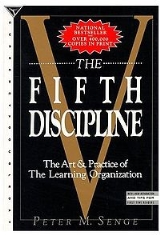
The Fifth Discipline
Encyclopedia
The Fifth Discipline: The Art and Practice of the Learning Organization is a book by Peter Senge
(a senior lecturer at MIT) focusing on group problem solving using the systems thinking
method in order to convert companies into learning organization
s. The five disciplines represent approaches (theories and methods) for developing three core learning capabilities: fostering aspiration, developing reflective conversation, and understanding complexity
.
"Systems thinking also needs the disciplines of building shared vision, mental models, team learning, and personal mastery to realize its potential. Building shared vision fosters a commitment to the long term. Mental models focus on the openness needed to unearth shortcomings in our present ways of seeing the world. Team learning develops the skills of groups of people to look for the larger picture beyond individual perspectives. And personal mastery fosters the personal motivation to continually learn how our actions affect our world." (p. 12)
People fail to recognize their purpose as a part of the enterprise. Instead, they see themselves as an inconsequential part of a system over which they have little influence, leading them to limit themselves to the jobs they must perform at their own positions. This makes it hard to pinpoint the reason an enterprise is failing, with so many hidden 'loose screws' around.
The tendency to see things as results of short-term events undermines our ability to see things on a grander scale. Cave men needed to react to events quickly for survival. However, the biggest threats we face nowadays are rarely sudden events, but slow, gradual processes, such as environmental changes.
Peter Senge
Peter Michael Senge is an American scientist and director of the Center for Organizational Learning at the MIT Sloan School of Management. He is known as author of the book The Fifth Discipline: The art and practice of the learning organization from 1990...
(a senior lecturer at MIT) focusing on group problem solving using the systems thinking
Systems thinking
Systems thinking is the process of understanding how things influence one another within a whole. In nature, systems thinking examples include ecosystems in which various elements such as air, water, movement, plants, and animals work together to survive or perish...
method in order to convert companies into learning organization
Learning organization
A learning organization is the term given to a company that facilitates the learning of its members and continuously transforms itself. Learning organizations develop as a result of the pressures facing modern organizations and enables them to remain competitive in the business environment...
s. The five disciplines represent approaches (theories and methods) for developing three core learning capabilities: fostering aspiration, developing reflective conversation, and understanding complexity
Complexity
In general usage, complexity tends to be used to characterize something with many parts in intricate arrangement. The study of these complex linkages is the main goal of complex systems theory. In science there are at this time a number of approaches to characterizing complexity, many of which are...
.
The Five Disciplines
The five disciplines of the learning organization discussed in the book are:- 1) "Personal mastery is a discipline of continually clarifying and deepening our personal vision, of focusing our energies, of developing patience, and of seeing reality objectively." (p. 7)
- 2) "Mental models are deeply ingrained assumptions, generalizations, or even pictures of images that influence how we understand the world and how we take action." (p. 8)
- 3) "Building shared vision a practice of unearthing shared pictures of the future that foster genuine commitment and enrollment rather than compliance." (p. 9)
- 4) "Team learningTeam learning-Team learning :Team learning is an educational method that strives to increase student engagement.The following principles guide the formation of the teams of learners:...
starts with dialogue, the capacity of members of a team to suspend assumptions and enter into genuine thinking together." (p. 10) - 5) Systems thinkingSystems thinkingSystems thinking is the process of understanding how things influence one another within a whole. In nature, systems thinking examples include ecosystems in which various elements such as air, water, movement, plants, and animals work together to survive or perish...
- The Fifth Discipline that integrates the other 4.
"Systems thinking also needs the disciplines of building shared vision, mental models, team learning, and personal mastery to realize its potential. Building shared vision fosters a commitment to the long term. Mental models focus on the openness needed to unearth shortcomings in our present ways of seeing the world. Team learning develops the skills of groups of people to look for the larger picture beyond individual perspectives. And personal mastery fosters the personal motivation to continually learn how our actions affect our world." (p. 12)
The Learning Disabilities
- 1) "I am my position."
People fail to recognize their purpose as a part of the enterprise. Instead, they see themselves as an inconsequential part of a system over which they have little influence, leading them to limit themselves to the jobs they must perform at their own positions. This makes it hard to pinpoint the reason an enterprise is failing, with so many hidden 'loose screws' around.
- 2) "The enemy out there."
- 3) The Illusion of Taking Charge
- 4) The Fixation of Events
The tendency to see things as results of short-term events undermines our ability to see things on a grander scale. Cave men needed to react to events quickly for survival. However, the biggest threats we face nowadays are rarely sudden events, but slow, gradual processes, such as environmental changes.
- 5) The Parable of the Boiling frogBoiling frogThe boiling frog story is a widespread anecdote describing a frog slowly being boiled alive. The premise is that if a frog is placed in boiling water, it will jump out, but if it is placed in cold water that is slowly heated, it will not perceive the danger and will be cooked to death...
- 6) The Delusion of Learning from Experience
- 7) The Myth of the Management Team

